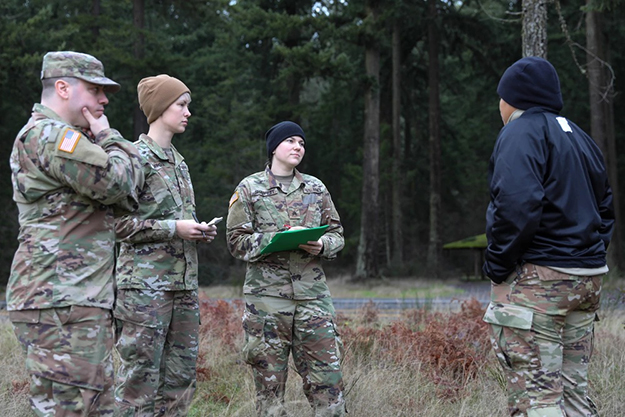Standing in a wooded area, Sgt. Isaiah Quinby is gathering information from a displaced individual who fled their home after being forcefully removed. It's important he gather as much information as possible from his line of questions to help paint an accurate picture of what is going on.
As Quinby finishes up, his evaluator talks with him and provides him with the feedback he needs to improve.
"The goal for today is to train on a number of different human intelligence collector tasks that we might not see month to month," said Quinby, a human intelligence collector for Alpha Company, 341st Military Intelligence Battalion (Linguist). "There are things we need to keep up on as human intelligence collectors."
Quinby is just one of the human intelligence collectors from Alpha and Bravo Companies, 341st Military Intelligence Battalion, who took part in a field training exercise at Joint Base Lewis-McChord during January inactive duty training. Those who participated tested their collection, interrogation and debriefing skills. The training focused on the unit's federal mission and helped the intelligence collectors prepare for potential deployments in the future.
"What is interesting about human collectors is that, the best way to get intel is you have to fight for intelligence and this means sticking our human collectors with maneuver elements infantry," said Chief Warrant Officer Two Garrison Lang, a human intelligence warrant officer with the 341st Military Intelligence Battalion. "We're putting our human collectors with them. They're going to the frontline getting that information, relaying it back to the commander."
Human intelligence is intelligence gathered by means of human sources and interpersonal contact. It is distinct from the more technical means of intelligence gathering such as signal interception. Human intelligence can also be conducted in a variety of ways, including via espionage, reconnaissance, interrogation, or witness interviews.
"The hardest part of doing these screening and debriefing training events is replicating the battlefield. The environment they would experience there. We're talking about large amounts of displaced people," said Lang. "They don't have all day to screen all these people because they're limited and how many they are, and they would just have to let certain people pass without being able to talk to them. But here we can manage the numbers so they can talk to everyone and get more reps with potential sources for human intelligence."
The three-day training exercise gave the soldiers an incredible chance to train on skills they often don't get a chance to train on. The 341st Military Intelligence Battalion is a Linguist Battalion, which requires many of the members to maintain a language. Drills can often be focused more on language skills training than on other intelligence tasks.
"Coming in as a 35M human intelligence collector with a language, the attrition rate is higher I would say than other MOSs and that is based on the language requirement," said Lang. "You have to take a Defense Language Aptitude Battery test, get assigned a language, go to language school, and pass your language, which is intensive. It can take anywhere from six months to a year and a half course of study. You're constantly under stress to pass at language school and get fully qualified before you can come back to Washington and then focus on maintaining the language."
January's three-day training exercise was also an opportunity to prepare human intelligence collection teams for their battalion four-day field training exercise during June's inactive duty training weekend. The exercise will bring together units from the 341st Military Intelligence Battalion, Delta Company, 898th Brigade Engineer Battalion and Army Reserve.





Read Comments